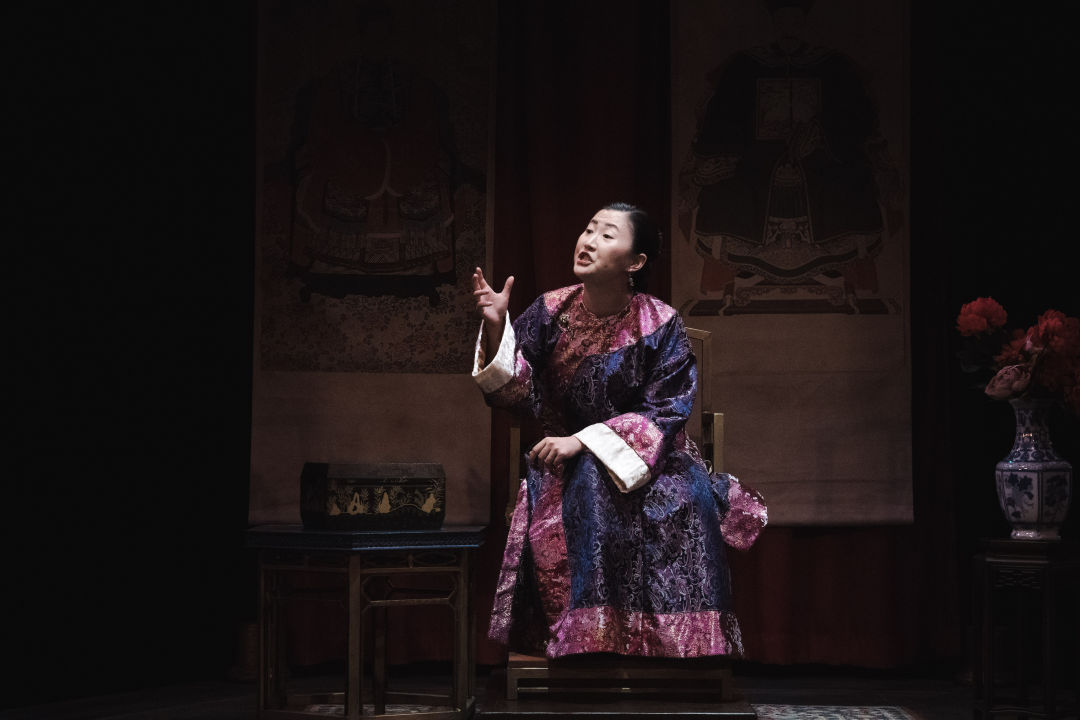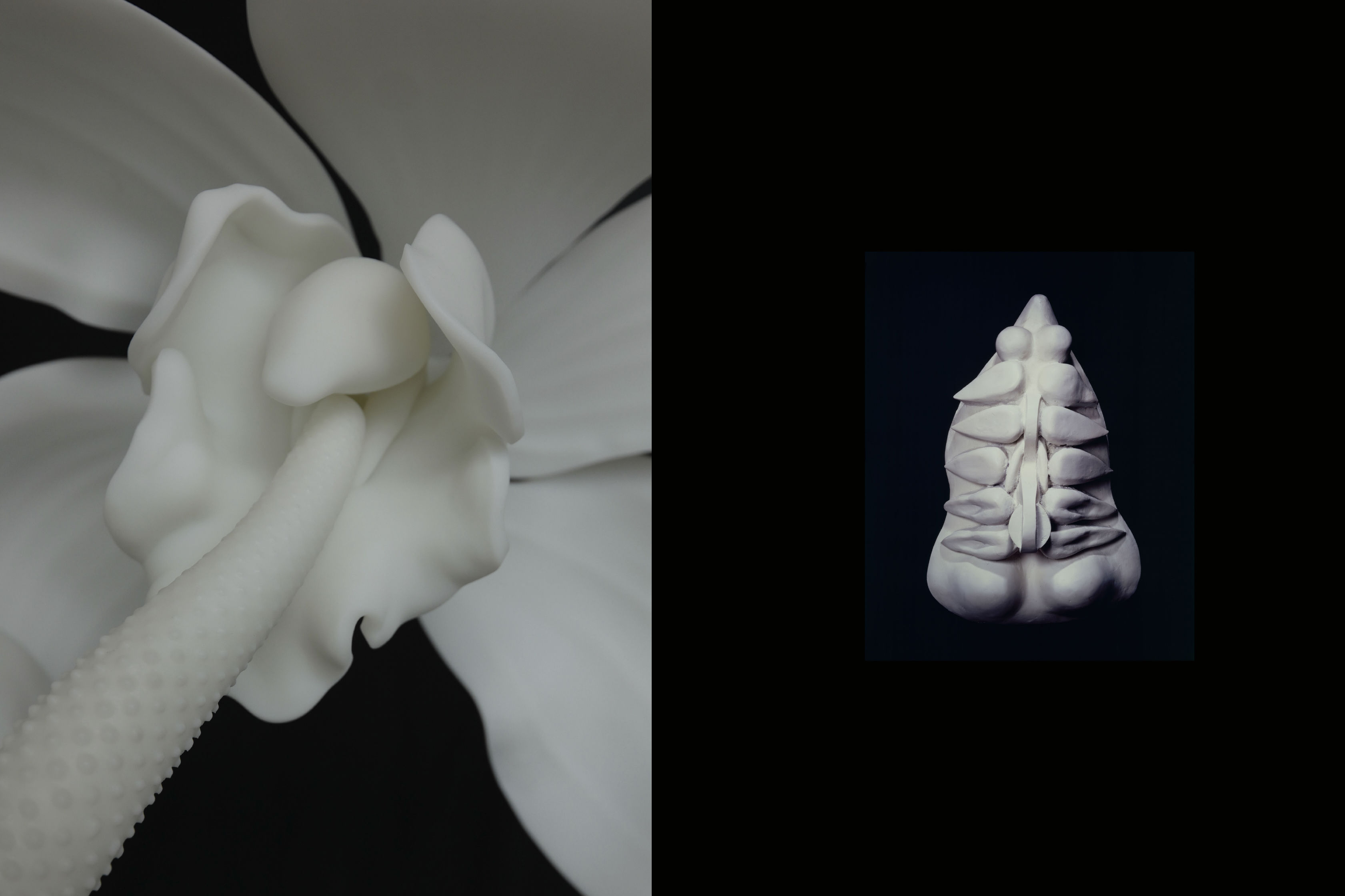The Chinese Lady at Artists Rep Is a Mostly Compelling Tale of Squashed Hope

Barbie Wu as Afong Moy in Artists Repertory Theatre’s The Chinese Lady
Image: Lava Alapai
At the opening of Artists Repertory Theatre’s first production in 19 months, the company’s outgoing artistic director Dámaso Rodríguez dropped a perhaps-little-known historical tidbit. While ART’s home space on SW Morrison Street continues to undergo renovation, the company has taken up residence with Portland Center Stage at the Armory on NW 11th. The building, Rodríguez relayed, was first erected in 1891 on the edge of Portland's then-thriving Chinatown as a foothold for the National Guard, while anti-Chinese violence and resultant riots swelled throughout the neighborhood.
This provided a startling backdrop for ART's season opener The Chinese Lady, Lloyd Suh's funny, bruising play about Afong Moy, the alleged first Chinese woman immigrant in the United States. Rodríguez's note elicited reverent "mmm"s from the audience at an even greater rate than his subsequent revelation that city commissioners Carmen Rubio and Dan Ryan were in attendance.
In brief: The Chinese Lady concerns Moy (Barbie Wu) and her translator Atung (Bern Tan) as they perform various iterations of a museum sideshow—first in New York, then on tour—throughout the 19th century. Moy is outfitted in exoticized robes and situated in a sort of Epcot-style "Chinese room," where she cheerfully demonstrates the use of chopsticks, showcases her bound feet, and describes the ancient origins of tea for us, the paying audience. As time wears on, her cheerfulness wanes; a lecherous meeting with U.S. president Andrew Jackson is a major fulcrum. By the end, we're asked to consider whether cultural sharing is an inevitable gateway to bloody conquest, and to observe the mechanics by which American optimism sours and spoils.
Sarah Ryung Clement's cannily conceived set underlines the various layers of performance at play. She transforms the Armory's intimate Ellyn Bye Studio into a makeshift thrust with no wing space, just risers arranged in a three-quarter round on the bare floor. Atung mostly speaks to us from a stool on that floor, but Afong Moy speaks from a stage-within-a-stage: her intentionally overdetermined "Chinese room" is a paper lantern-strewn gilded cage, protected on all sides by a lavish curtain, physically elevated above the rest of the playing space. Moy describes it as "a room unlike any in China," and Clement’s design highlights the distance.
Lava Alapai's direction, too, foregrounds the play's meta-theatrical dimensions. Alapai understands that Moy performs as much for herself as her curious American audiences: she makes sense of the fact that she's been torn away from home as a teenager by deciding it's her mission to "generate cultural understanding" between China and the U.S., which works, until it doesn't. Wu keeps the darkest shades of Moy's circumstance at bay with a 1,000-watt grin for a while, and then gradually deteriorates in the play's final half before walloping us with a monologue about a dream of cultural harmony, destroyed. When she lays out a summary of the Chinese Exclusion Act, it could be textbook-dry. Instead, it feels like a gut-deep betrayal.
Not everything lands so smoothly. Alapai has mounted Suh's script well and coaxed out memorable performances from her two actors, but the script itself sometimes stumbles. Provocative subtext about the thin line between appreciation and appropriation becomes an overcooked onstage debate; a midpoint soliloquy from Atung about his sexual desires confuses more than it clarifies. Throughout, Suh introduces an ambitious number of thematic threads, but in the play's final moments, it can feel like he's scrambling to gather them together instead of smoothly landing his ship.
Still, there's plenty to recommend. Wu tripped on a few lines opening night (something likely to smooth out by the end of the run), but by and large, she's a charismatic, compelling lead. Her and Tan's dynamic during the Andrew Jackson scene is positively chilling (this play joins 2010's Bloody Bloody Andrew Jackson as a proud member of the "tragicomic anti-Jackson theatrical universe"). The thematic threads Suh does pull off—about the way global empires reduce cultures to trinkets, about the tensions between truth and told history—are juicy and well-rendered.
The play is especially effective when it explores the gap between the China Moy remembers and the real one being ravaged by the British Empire during the Opium Wars. As her country becomes a playground for the West, she unwittingly sets its romanticized image in stone on her oppressors' shores. In moments like these, The Chinese Lady rings with the vitality of a little-known story well-told. Only fitting, then, that it be introduced with another one about the very the building it’s performed in.
The Chinese Lady
7:30 p.m. Wed–Sat, 2 p.m. Sat–Sun through Nov 14, Ellyn Bye Studio at Portland Center Stage, $15–35




